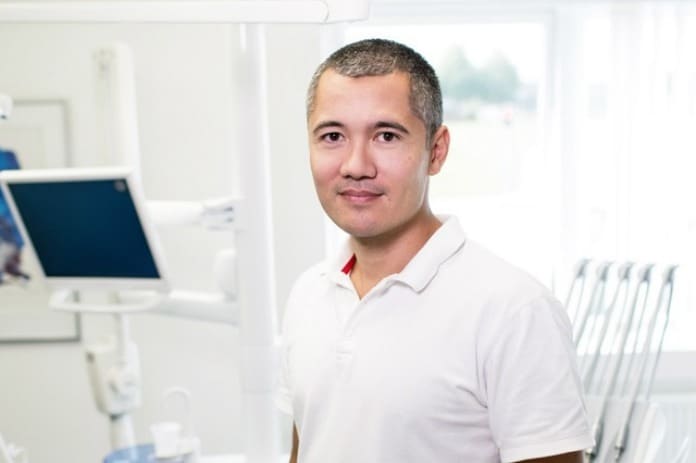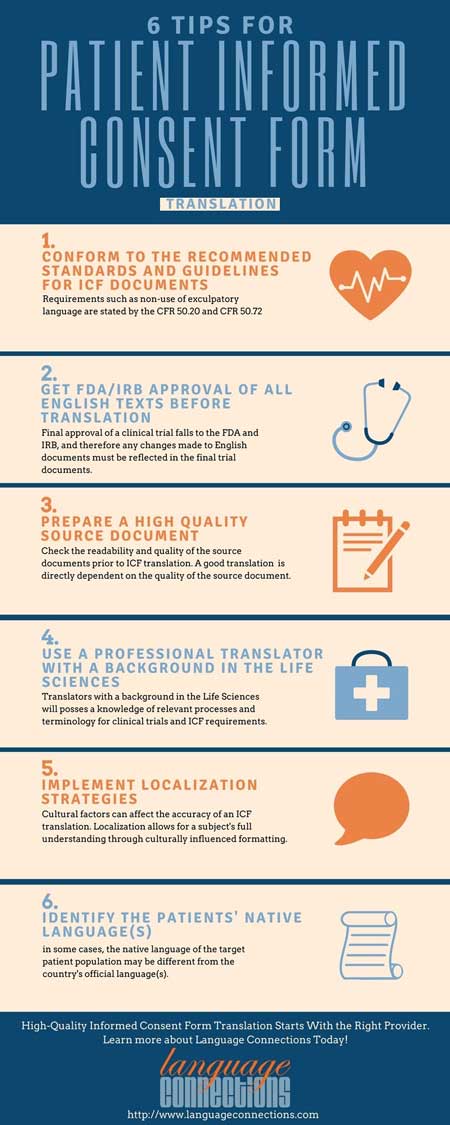As a language service provider that also specializes in the life sciences, we would like to share some tips from our years of experience working with CROs and bio- pharmaceutical companies that conduct international clinical trials. Below are six tips on how to best prepare for patient informed consent form translation.
When is Patient Informed Consent Form Translation Needed?
Documents with legal requirements need to undergo extra levels of scrutiny when being translated. Patient Informed Consent Forms (ICF) are especially important, due not only to the levels of review they undergo by the Food and Drug Administration (FDA) and Institutional Review Boards (IRBs), but also due to the fact that clear language is necessary to ensure proper consent by a non-English speaking subject.
There are a few instances where certified translation services (as well as professional interpreters) will be necessary in order to obtain legally qualified consent by a non-English speaking subject. They include:
- Conducting clinical trials in a foreign country
- Conducting clinical trials for predominantly non-English speaking subject groups
- Conducting clinical trials where a few of the subjects will be non-English speaking
Whether your situation calls for a full IRB approved translation of your patient informed consent form, or else a translated short form, there are a few steps you can take to prepare yourself for this type of document translation.
6 Tips Regarding Preparation For Patient Informed Consent Form Translation

There are quite a few requirements regarding language as stated by the CFR 50.20 and CFR 50.72.
Some major ones to keep in mind include non-use of exculpatory language, and keeping written text plain and simple through the use of language that can be easily understood by anybody (i.e. written at a standard 4th and 8th grade level of reading ability).
These requirements are for both English speakers and non-English speakers. Any technical or scientific wording must be clearly explained, or else replaced with simplified terminology. In the event that technical language is still present in your documents, be sure to speak to your translation agency about hiring a translator with related industry knowledge to avoid potential mis-translations.
In the event that an IRB approved ICF document is not available for a non-English speaking subject, an IRB approved translated short form must be provided to the subject in their native language. This must also be written in a way that is easily understood by subjects. It is also suggested that ICFs be written in neutral tonnage and second person, so as not to sound presumptuous of subject consent.
When dealing with informed consent for non-English speaking patients with limited literacy, or when conducting a consent interview using a short form, a trained interpreter must be present. He or she will ensure proper communication of the content in the informed consent form, any other information about the trial, and the subject’s voluntary consent. Ad hoc translation can not be provided for the clinical documents, and therefore it is best to have a professional present.

This stems off of our first tip. Final approval of a clinical trial falls to the FDA and IRB, and therefore any changes made to English documents must be reflected in the final trial documents.
To avoid costly re-translations, it is best to wait until after your English language has been approved by the necessary institutions, before undergoing Informed Consent Form translation services.
The job of a professional translator is to render the source text (the clinical documents you provide in English) into the target language. As such they can not be held responsible or liable should any changes be made to the English text after the translation was solicited or completed.
If you do need to make changes to the source document during the informed consent form translation process, this needs to be clearly communicated to the translation agency so they can make the necessary changes.

Check the readability and quality of the source documents prior to ICF translation. A good translation is directly dependent on the quality of the source document.
Due to the delicate and technical nature of informed consent forms, this is especially critical.
A professional translator can not always predict what certain language means, or fill in the blanks if everything is missing. Therefore, it is a good idea to review your ICF documents before submitting as source material for translation (assuming you already have FDA/IRB approval of documents, this shouldn’t be a major issue).

As mentioned before, industry specialized translators (and interpreters) can help prevent any mis-understandings or mis-translations of ICF documents.
Translators with a background in the Life Sciences, and even more segmented sectors within the Life Sciences, may also posses a background knowledge of necessary processes for clinical trials and ICF requirements (either from professional or translation experience).
Experienced translators also take great pains to use well-established terminology and identify appropriate language equivalents in order to maintain the integrity of the source document. As such, using a translator with a background in the Life Sciences or clinical research will allow them to do this more accurately during your informed consent form translation.

Cultural factors can affect the accuracy of an ICF translation. Literal translations commonly yield nonsensical texts that are out of context because they have not been culturally adapted for the intended target patient population.
If you are performing clinical trials in a foreign country, being aware of culturally sensitive language and formatting is essential for a subject’s full understanding.
This can be something as simple as preparing the translated Informed Consent Form in a right to left reading format, to changing numerical and currency formats, to culturally sensitive explanations for parts of the trial.

Various countries have multiple official languages, or several dominant spoken languages that can include dialects.
In some cases, the native language of the target patient population may be different from the country’s official language(s). You must be sure of the proper language of your subjects, allowing them the greatest ability to understand and consent to the trial.
If this means providing the documents in a rare dialect, or in multiple languages depending on the demographics of the area you are targeting, this must be determined prior to submitting informed consent documents for translation.
High-Quality Informed Consent Form Translation Starts With The Right Provider
If your company is considering conducting clinical trials abroad, Language Connections would be happy to guide you through the process as your language service provider. We translate in over one hundred languages, using a well-established translation process to ensure quality and accuracy.
Our team of expert linguists are all native speakers with a background in the life sciences, and we have been providing certified translations of clinical trial related documentation for over 20 years.
While these tips certainly don’t cover every aspect of an informed consent form translation, they’re a good starting point for those looking to contract language services. We’ve even broken them down in an easy to read infographic!
Learn More About Our Life Science Translation services!!!
About Language Connections:
Language Connections is one of the top language service companies in the US. Over the last 30 years, we’ve focused on providing the best business translation services, interpreting services, as well as interpreter training and customized language training programs. In addition to top-tier corporate language training, we offer certified corporate interpreters and professional business translation services in 200+ languages. Our network includes linguists with backgrounds in all major industries. They’re ready to meet your needs, whether they’re for technical translation services, legal translation, government translation services, international development translation services, education translation services, life sciences translation, or something else. Reach out to us today for a free quote on our cost-efficient and timely translation services, interpreters, or other linguistic services.
Language Connections Inc.
2001 Beacon Street, Suite 105,
Boston, MA 02135
Phone: +1-617-731-3510
Email: service@languageconnections.com



